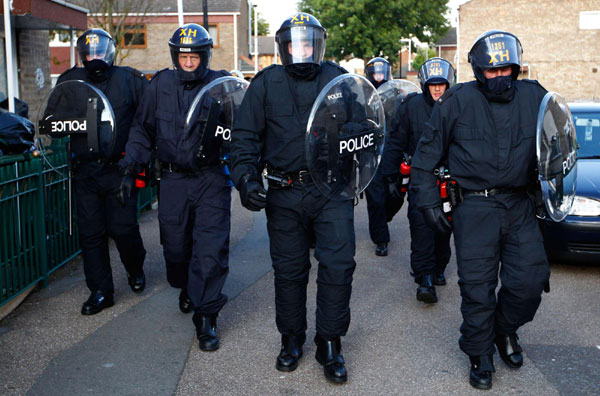-
News >World
UK PM recalls Parliament for London riot crisis
2011-08-10 10:20
LONDON - British Prime Minister David Cameron recalled Parliament from its summer recess Tuesday and nearly tripled the number of police on the streets after three days of rioting in London blossomed into a full-blown political crisis.
Riot police patrol through an estate in east London August 9, 2011. Riots flared in English cities and towns on Tuesday night as London waited anxiously to see if thousands of police deployed on its streets could head off the youths who had rampaged across the capital virtually unchecked for three nights. [Photo/Agencies]
Cameron described the scenes of burning buildings and smashed windows in London and several other British cities as "sickening", but refrained from more extreme measures such as calling in the military to help beleaguered police restore order.
Instead, he said 16,000 officers would be on the streets of the capital Tuesday night, almost tripling the number that were out Monday night.
"People should be in no doubt that we will do everything necessary to restore order to Britain's streets and to make them safe for the law-abiding," Cameron told reporters after rushing home from an Italian vacation to chair a crisis meeting at his Downing Street office.
A wave of violence and looting has raged across London since Saturday, as authorities struggled to contain the country's worst unrest since race riots set the capital ablaze in the 1980s.
Some 525 arrests have been made in London alone and dozens were arrested in other cities. Police announced Tuesday that plastic bullets would be "one of the tactics" available to officers to quell the riots.
The riots also claimed their first death - a 26-year-old found shot dead in a car.
Parliament will return to duty on Thursday, as the political fallout from the rampage takes hold. The crisis is a major test for Cameron's Conservative-led coalition government, which includes Liberal Democrats who had long suspected its program of harsh budget restraints could provoke popular dissent.
In London, groups of young people rampaged for a third straight night, setting buildings, vehicles and garbage dumps alight, looting stores and pelting police officers with bottles and fireworks into the wee hours of Tuesday. The spreading disorder was an unwelcome warning of the possibility of violence during London's 2012 Summer Olympics, less than a year away.
England's soccer match Wednesday against the Netherlands in London's Wembley stadium was canceled to free up police officers for riot duty.
Cameron said leaves have been canceled for police in London, and reinforcements have been called in from all over the country. Armored vehicles were deployed in some of the worst-hit districts, but authorities still struggled to keep pace with the chaos unfolding at flashpoints across London, in the central city of Birmingham, the western city of Bristol and the northwestern city of Liverpool.
"The violence we have seen is simply inexcusable. Ordinary people have had their lives turned upside down by this mindless thuggery," police commander Christine Jones said.
London's police said 14 people were injured. It was unclear if the man who died had been among them.
The rioters appeared to have little unifying cause - though some claimed to oppose sharp government spending cuts, which will slash welfare payments and cut tens of thousands of public sector jobs through 2015.
But many were attracted simply by the opportunity for violence. "Come join the fun!" shouted one youth in the east London suburb of Hackney, where shops were attacked and cars torched.
Rioters were left virtually unchallenged in several neighborhoods and able to plunder from stores at will or attempt to invade homes. Restaurants and stores closed early across London again Tuesday, fearing more looting.
Graham Reeves, 52, stood dumbstruck in front of the smoldering ruins of his family store, the House of Reeves on Croydon in south London. The store is a local landmark run by his family for decades - he said his 80-year old father was hysterical when he heard the news.
"No one's stolen anything," Graham Reeves said, "They just burnt it down."
Disorder flared throughout the night, from gritty suburbs along the capital's fringes to central London's posh Notting Hill neighborhood.
